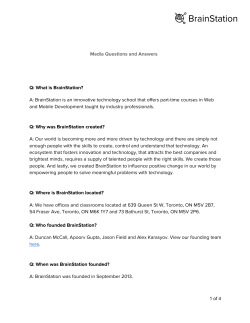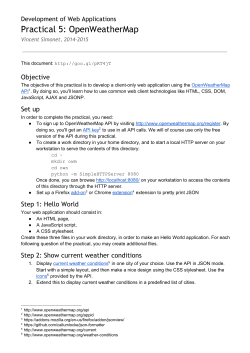
Government of India Ministry of Communications & Information Technology
Government of India Ministry of Communications & Information Technology Department of Electronics & Information Technology (DeitY) Title of Policy: Policy on Open APIs for Government of India Preamble: Government of India (GoI) aims to make all Government services digitally accessible to the common person in his/her locality through common service delivery outlets. To meet this objective, there is a need for an interoperable ecosystem of data, applications and processes which will make the right information available to the right user at the right time. In order to make rapid progress in this direction, Government of India (GoI) has initiated various programs including Mission Mode Projects (MMPs). In this context, it is important to ensure interoperability among various e-Governance systems to upgrade the quality and effectiveness of service delivery. This would also facilitate the single-window concept to deliver the required electronic services by various Government organizations. For promoting Open Standards for software interoperability across various Government departments and agencies, GoI has already notified “Policy on Open Standards for e-Governance” and “Technical Standards on Interoperability Framework for e-Governance”. The world-wide initiatives on “Open Government” also focus on APIs to easily access the information available with or collected by Government Organizations. In view of the above, there is a need to formulate a policy for the Government Organizations in India to provide Open Application Programming Interfaces (APIs). The “Policy on Open APIs for Government of India” (hereinafter referred to as the “Policy”) will encourage formal use of Open APIs in Government Organizations. This policy sets out the Government’s approach on the use of “Open APIs” to promote software interoperability for all e-Governance applications & systems and provide access to data & services for promoting participation of citizens and other stakeholders. 1. Objectives of the policy: The objectives of this policy are to: Ensure that APIs are published by all Government Organisations for all e-Governance applications and systems. Enable quick and transparent integration with other e-Governance applications and systems. Enable secure and reliable sharing of information and data across various e-Governance applications and systems. Policy on Open APIs for Government of India Draft Provide APIs for data collection and making information and data available to public. Provide guidance to Government Organizations in developing, publishing and using these Open APIs. 2. Definitions Please refer Appendix – I. 3. Policy Statement Government of India shall adopt Open APIs to enable quick and transparent integration with other e-Governance applications and systems implemented by various Government Organizations and to make information and data available to the public, thereby providing access to data and services to all stakeholders and promoting citizen participation. The Open APIs shall have the following characteristics for publishing and consuming: 3.1 The relevant information being provided by all Government Organisations through their respective e-Governance applications shall be open and machine readable. 3.2 All the relevant information and data of a Government Organisation shall be made available through Open APIs to other e-governance applications and systems and public, as per the classification given in the National Data Sharing and Accessibility Policy (NDSAP) 2012. 3.3 All the relevant information, data and functionalities within an e-Governance application or system of a Government Organisation shall be made available to other e-Governance applications and systems through Open APIs. 3.4 A Government Organisation consuming the data and information from other eGovernance applications and systems using Open APIs shall manage information handling, authentication, authorisation and auditing through a process as defined by the API publishing Organisation. 3.5 Each published API of a Government Organization shall be accessible free of charge to other Government Organizations and public. 3.6 Each published API shall be properly documented with sample code and sufficient information for developers to make use of the API. 3.7 The life-cycle of the Open API shall be made available by the API publishing Page 2 of 6 Policy on Open APIs for Government of India Draft Government Organisation. The API shall preferably be backward compatible with earlier versions. 4. Nature of Compliance Mandatory 5. Applicability The policy shall be applicable to all Government Organisations under the Central Government and those State Governments that choose to adopt this policy for the following categories of eGovernance systems: All new e-Governance applications and systems being considered for implementation. New versions of the legacy and existing systems. 6. Implementation Mechanism i) GoI shall formulate detailed implementation guidelines for rapid and effective adoption of the policy. ii) Government Organisations shall publish the APIs so that the public can access relevant information and data from e-Governance applications and systems. iii) Government Organisations shall publish the APIs for integrating with their e-Governance applications and systems. iv) Government Organisations shall integrate with the e-Governance applications and systems of other departments through the messaging gateway built on open standards by the Department of Electronics and Information Technology (DeitY) under the National eGovernance Plan (NeGP). v) Government Organisations shall ensure compliance with notified XML standards for developing APIs. vi) GoI shall constitute an oversight committee under the chairmanship of Secretary, DeitY for facilitating the implementation of this policy and its provisions thereof. 7. Review of the Policy GoI shall have the right to review and revise the policy as and when required. 8. Point of Contact Page 3 of 6 Policy on Open APIs for Government of India Draft All queries or comments related to the “Policy on Open APIs for Government of India” shall be directed to the Joint Secretary (e-Governance), DeitY at jsegov@deity.gov.in. Page 4 of 6 Policy on Open APIs for Government of India Draft Appendix – I Definitions 1 API: The term Application Programming Interface (API) means any mechanism that allows a system or service to access data or functionality provided by another system or service. The API is generally used to interact (like query, list, search, sometimes submit & update) directly with the specific information on a system, to trigger some action on other systems, or to perform some other action on other systems. 2 Domain: A sub-category under an Information Technology field is a Domain; specific purpose within a “Domain” is known as “Area”. For example, “Document type for Web publishing content” is one Area under the “Presentation” domain. 3 Government Organization: For the purpose of this policy, a Government Organisation refers to all Ministries/ Departments/ offices/ statutory bodies/ autonomous bodies, both at the Central and State levels. Government organizations offering commercial services are not included. 4 e-Governance: A procedural approach in which the Government and the citizens, businesses, and other stakeholders are able to transact all or part of their activities using Information and Communication Technology tools. 5 Systems: A group of interacting, interrelated, or interdependent elements forming a complex whole. Information System is a combination of people, hardware, software, communication devices, network and data resources that processes (can be storing, retrieving, transforming information) data and information for a specific purpose. 6 Legacy System: An old method, technology, computer system, or application program that continues to be used, typically because it still functions for the users' needs, even though newer technology or more efficient methods of performing a task are now available. 7 New Version of Legacy System: The legacy system which has undergone a major version change due to re-engineering like functional changes, architectural changes, technology changes, change in storage mechanism, design implementation changes etc. 8 Open API: Open API is the API that has been exposed to enable other systems to interact with that system. Open API may be either integrated with the host application or may be an additional piece of software that exposes any proprietary API with an Open API equivalent. The Open API must be free of charge and without restrictions for reuse & modifications. Page 5 of 6 Policy on Open APIs for Government of India Draft 9. Policy on Open Standards for e-Governance: The Policy on Open Standards for eGovernance provides a framework for the selection of Standards to facilitate interoperability between systems developed by multiple agencies. It is available at https://egovstandards.gov.in/sites/default/files/Policy/Policy%20On%20Open%20Standards/P olicy_on_Open_Standards_for_e-Governance_Ver1.0.pdf 9 Technical Standards on Interoperability Framework for e-Governance: This document describes technical standards to be adopted for e-Governance application in the areas covered, as per the Policy on Open Standards for eGovernance. It is available at https://egovstandards.gov.in/sites/default/files/Published_Standards/Technical%20Standards %20for%20IFEG/Technical_Standards_for_IFEG_Ver1.0.pdf. 10 National Data Sharing and Accessibility Policy (NDSAP-2012): The objective of this policy is to facilitate access to Government of India owned shareable data and information in both human readable and machine readable forms through a network all over the country in a proactive and periodically updatable manner, within the framework of various related policies, Acts and rules of Government of India, thereby permitting a wider accessibility and use of public data and information. It is available at http://ogpl.gov.in/NDSAP/NDSAP30Jan2012.pdf Page 6 of 6
© Copyright 2025










